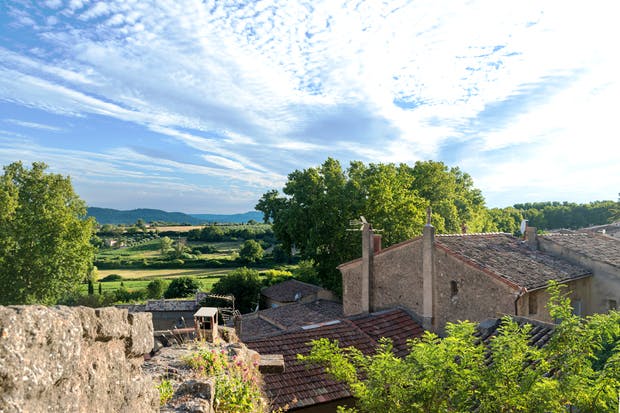Friends have a house in Provence, near the foot of Mont Ventoux. Even in a region so full of charm and grace, it is an exceptional spot. Although nothing visible dates from earlier than the 18th century, the house is in the midst of olive groves and there has been a farm dwelling for centuries. I suspect that one would find medieval masonry in the foundations. Beginning life as a simple farmhouse, it has been bashed about, added to and poshed up. On the western side, the exterior has pretensions to grandeur. The other elevation is more feminine; you expect to find Fragonard painting a girl on a swing.
At this season, the parasols act as the drawing room. There is a pool, and there were expeditions to Nîmes, Orange and Avignon. But it was also pleasant to read a book while occasionally looking up beyond the oleanders to the heights of Ventoux. On some evenings we saw shooting stars. Pleiades, the stars are known as, and everything in Provence calls Ronsard to mind. Here, carpe diem is a pleasure and a commandment.
Within fig-gathering reach of the house is an enchanting garden, and its kitchen plots almost yield more than the inhabitants can eat. This is the realm of Ceres. Provence ought to have such a tutelary goddess because the Romans created it: Provincia Romana. Was that not the greatest civilising mission in the history of imperialism, surpassing anything that even we British achieved? The conquerors do not only deserve credit for their buildings, but for the Romanesque architecture which they inspired. Modern Provence is a Franco-Roman flowering: Roman genius and discipline, the bounty of nature — and French peasant cunning. It is an irresistible combination; Julius Caesar meets Père Goriot (but if poor old Goriot had lived in Provence he would have softened and there would have been no story).
I have a prejudice against pink wine, except in the form of very old port. But all wines flourish in the right context. Pink champagne might be fine if drunk from a tart’s trotter in Madame Claude’s; I have never tried. In rural Greece, retsina works; in San Gimignano, the same is true of vernaccia. Neither would stand up to a wet London day in November. In Provence, once the last crumbs of croissant had gone, we moved on to local rosé, which has the merit of being non-alcoholic. The whites slipped down equally gently. The wines of Glen Luberon, on the other side of Ventoux, have improved greatly in recent years.
Saucisson, ham, chèvre: the regional produce is superb. Ned and Louis, precocious gourmets whose exploits have been celebrated in this column, broke records for the consumption of snails. The little local restaurants that we tried were all admirable: they have to be, as most of their customers are French. Moreover, despite the collapse of the pound, it did not feel as if we were paying in a strong currency. I fear it might be different in Paris.
But there are restaurants which add trumpets to locality and take terroir to new supremacies. In Avignon, next to the Palais des Papes, a chef called Christian Etienne pitched his toque a generation ago. He has now handed over to disciples. Over the past 20 years, I have eaten there three times, and nothing changes. It has a Michelin star: why only one? There is a serene self-confidence, and indeed a hint of civilised arrogance. This kitchen knows how to cook, and sees no reason for pretend humility. It makes local ingredients sing, as Provençal chefs did for the Avignon Popes. Though only just ready, a white Châteauneuf, Domaine de la Janasse 2014, was a sound recommendation. But it will keep for years. A Gigondas, Domaine de Montirius ’07, was equally delicious, as was a Domaine du Cayron from the same year. That appellation can reach heights.
There is only one thing wrong with Provence. Leaving it.
Got something to add? Join the discussion and comment below.
Get 10 issues for just $10
Subscribe to The Spectator Australia today for the next 10 magazine issues, plus full online access, for just $10.















Comments
Don't miss out
Join the conversation with other Spectator Australia readers. Subscribe to leave a comment.
SUBSCRIBEAlready a subscriber? Log in